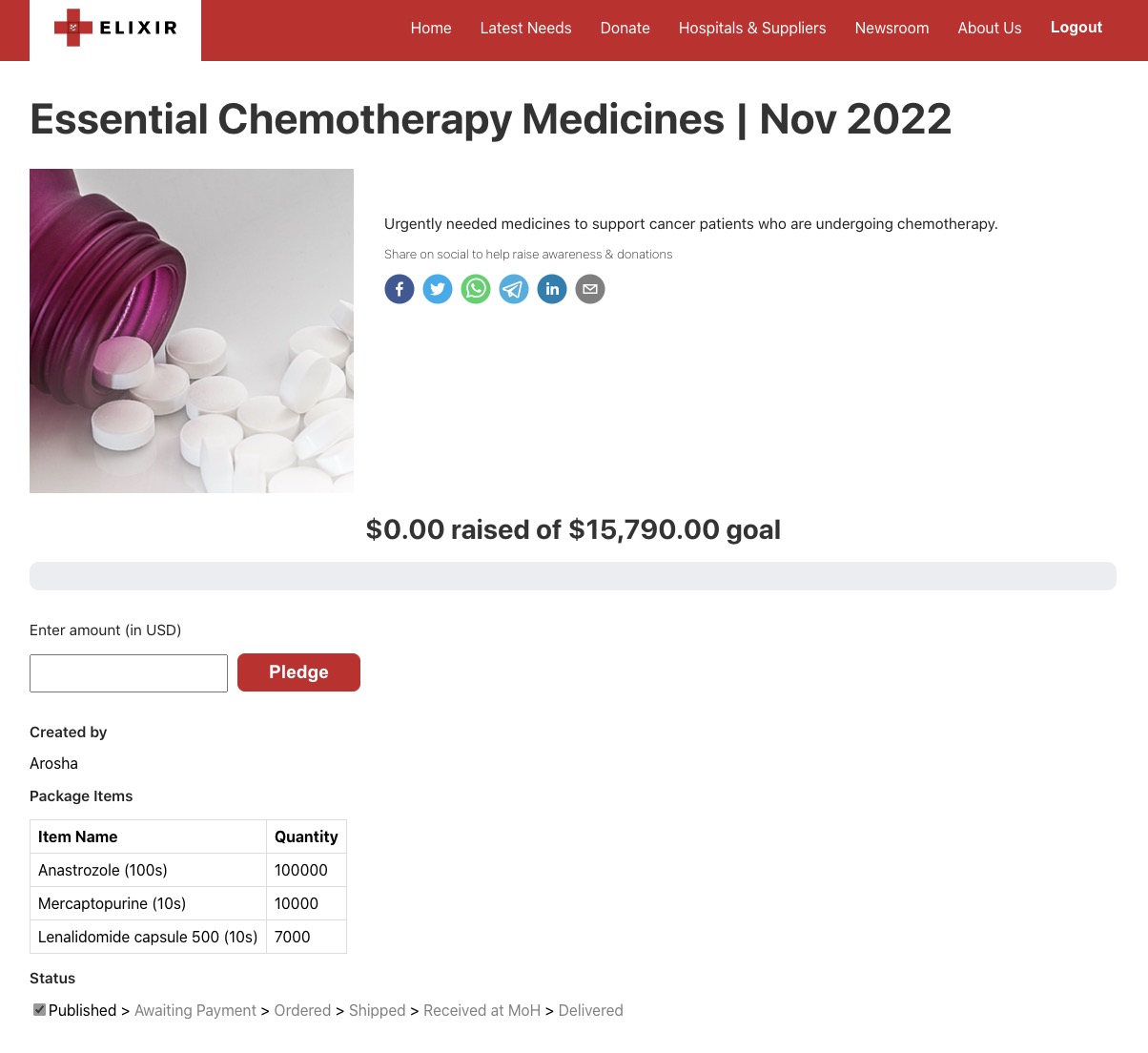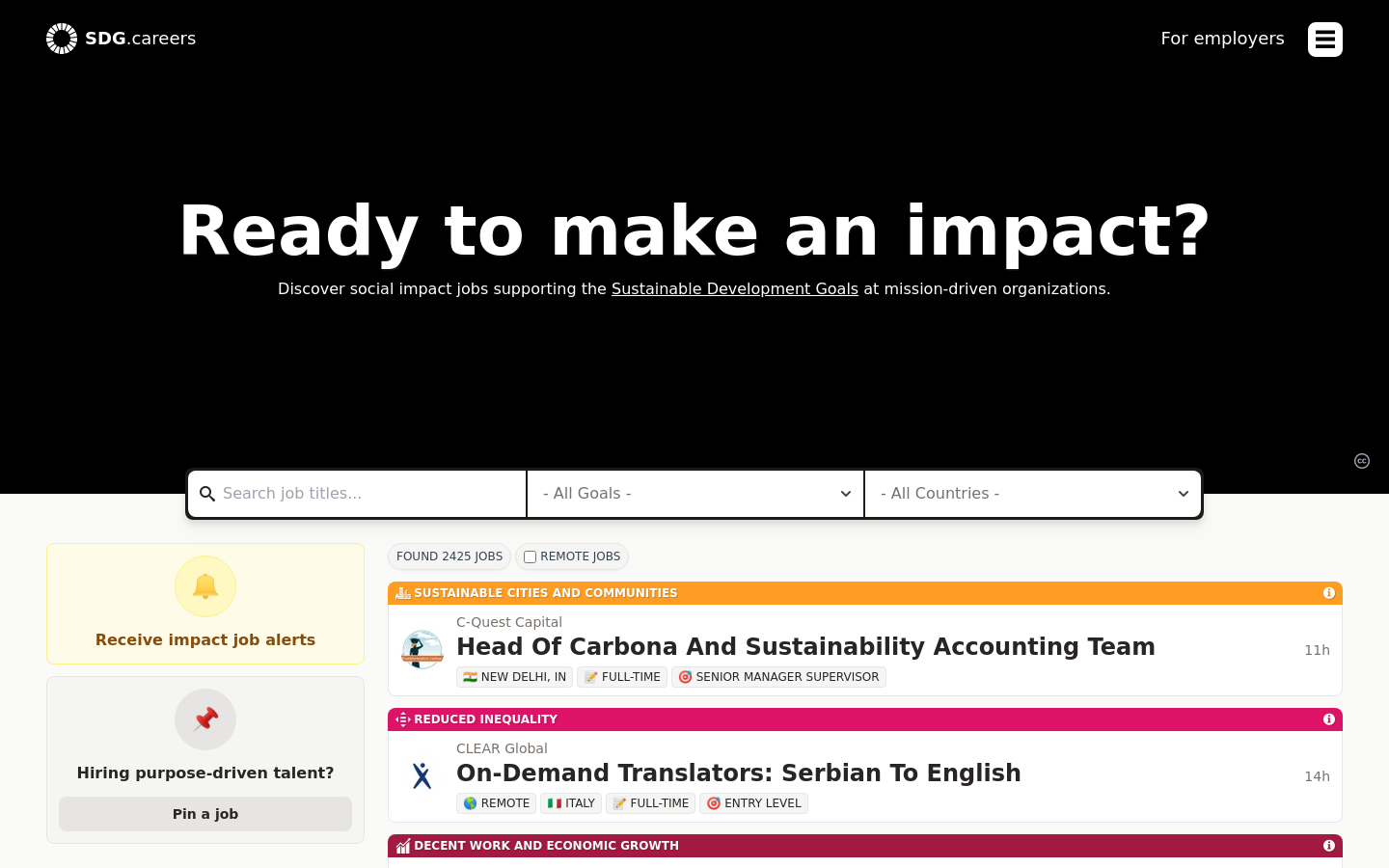Civic Tech Field Guide
Sharing knowledge and productively growing the fieldSearch Results - AI (4495)
Showing 4495 Results

Justicia Lab
New York, NYWe Build Digital Tools for Immigrant Justice

Response Innovation Lab Uganda
Kampala, UgandaThe Uganda Response Innovation Lab (Uganda RIL) was founded in 2018 by Save the Children Uganda. The main objective of the lab is to support the humanitarian response to 1.4 million refugees from eight East African countries, mainly from the Democratic Republic of Congo and South Sudan, and their host communities across 13 districts in the country through innovative approaches, systems, technologies and products.

Elixir
Batticaloa, Sri LankaA platform to consolidate emergency medical needs across a country, create aid packages of medicines and supplies, centralize supplier quotations, select most cost-effective supplier, and match donors willing to fund aid packages.

SDG.careers
Estonia (Eesti Vabariik)Discover social impact jobs supporting the Sustainable Development Goals at mission-driven organizations.

Research Excellence Framework Impact case study database
United Kingdom of Great Britain and Northern Ireland (the)"Documents put together by university departments that attempt to explain the reach of their research beyond academia."

Sovereign Tech Fund
BerlinStrengthening Digital Infrastructure and Open Source Ecosystems in the Public Interest

Hoplr
Ghent, BelgiumThe all-in-one platform for community engagement

Civic Listening Corps
Washington, DCThe CLC is a volunteer network of individuals trained to monitor for, critically evaluate, and report misinformation on diverse topics central to our civic life: voting, elections, public health, civil rights, and other important issues.

SPRIN-D
BerlinThe Federal Agency for Disruptive Innovation SPRIND is creating spaces for innovators, where they can take risks and think radically different.

The People’s Database for Community-Based Police Accountability
Berkeley, CA, USAA Berkeley Copwatch + WITNESS Initiative

Consumer Reports Share My Story
New York, USAA platform for CR members to share their stories on a given topic, like medical bills

Advancing Democracy Fellowship
United States of America (the)This joint initiative from Hearken, Solutions Journalism Network and Trusting News will equip newsroom-based journalists to transform their coverage of democracy through solutions-focused reporting that builds trust and avoids polarization.

Forerunner
San FranciscoThe Floodplain Management Platform for Resilient Communities

Tech Matters
Palo AltoWe help social change leaders understand what tech can and can’t do, and build the tech solutions behind solving a social problem.

“Seeing” Neighborhoods through “Big” Data
Boston, MAModern administrative data—from 311 and 911 calls to building permit applications to Tweets—offer a detailed view of events and conditions across the city.

The Atlantic
Palo AltoThe Atlantic is an American magazine and multi-platform publisher. It features articles in the fields of politics, foreign affairs, business and the economy, culture and the arts, technology, and science. - Wikipedia

Custodianship in the Urban Commons
Boston, MABARI has worked closely with the Mayor’s Office of New urban Mechanics and the 311 system examine how Bostonians contribute to the maintenance of the public spaces and infrastructure of neighborhoods—that is, custodianship in the urban commons.



The task force Digital Organizing is a group of researchers who study the implications of digital practices for the processes of organizing.

Opening in early 2012, The Social Media Listening Center at Clemson University is an interdisciplinary, cutting-edge laboratory that seeks to monitor, measure, and engage in social media conversations from across the web.

Responsible Computing Challenge
Mountain View, CA, USAThe Responsible Computing Challenge - supported by the Mellon Foundation, Omidyar Network, Schmidt Futures, Craig Newmark Philanthropies, USAID, Mozilla - fund academic teams that combine faculty and practitioners from Computing, Humanities, Library and Information Science, and Social Science fields in order to reimagine how the next generation of technologists will be educated.

An upskilling initiative "to equip 1,000 adults from low-income backgrounds with the tools and skills they need to become software engineers and thrive in tech careers."

Congressional Directory
Washington, DCThis site contains directories for the 41st (1869-1871) -104th (1995-96) Congresses forward, as well all Interim editions (online-only revisions) for the 105th Congress forward. Documents are available as ASCII text and Adobe Portable Document Format (PDF) files

GDDF 2023 builds on three years of successful global virtual forums that engage over 3,000 participants each time and feature keynote speakers from USAID, tech companies, and across the digital development ecosystem.

Democracy Classroom
United Kingdom of Great Britain and Northern Ireland (the)Bringing together democratic organisations and sharing non-partisan resources for teachers to support young people to engage in elections.

Data Justice Conference
Cardiff University, Cardiff CF10 3AT, UKData Justice Lab conference at Cardiff University and online

Gas Leaks
United States of America (the)Gas Leaks is exposing the truth about dirty, dangerous, deadly gas disinformation

Project Dokaz Alliance
450 Serra Mall, Stanford, CA 94305, USAThis project brings together leading innovators from the international criminal law community with pioneers in the Web3 ecosystem to develop secure and resilient solutions for accountability in Ukraine.

This Coursera course aims to help learners understand how inequity and injustice can become embedded in technology, science, and associated policies, and how this can be addressed.

The Stellar Development Foundation currently holds 30 billion XLM to be used for promoting and enhancing Stellar.

Trusted Voices
TorontoTrusted Voices is a platform focused on increasing transparency in news media. Using blockchain technology, Trusted Voices tracks source material to create a chain of custody from the device used to capture content to its usage on various media platforms.

Theseus
TorontoTheseus is an enterprise logistics system to track, trace and optimize the global movement of food goods while reducing waste, fostering fair economic opportunities, and directly engaging consumers to learn more about the origins of their food.

Emerge
TorontoWe use emerging technologies - like blockchain, IoT devices and sensors, and artificial intelligence - to address some of the world’s most pressing issues, as defined by the UN Sustainable Development Goals.

Homeward
TorontoHomeward is an identity management system and intelligent resettlement platform for displaced populations.

Equitech Scholars
Chicago, ILAn 8-week program for current undergraduates to learn how to use data science and AI for social impact

demokratie.today
Mühlleite 13, 91465 Ergersheim, GermanyDeutschlands Nr. 1 Consul-Anbieter. Consul is the world's most successful platform for citizen participation.

Starling Lab
CaliforniaA new methodology to restore trust in digital media

The Starling Lab Journalism Fellowship
CaliforniaThe Starling Lab, a research center anchored at Stanford University’s School of Engineering and the University of Southern California’s Shoah Foundation, has developed a ground-breaking framework to combat mis/disinformation by tracking the provenance of digital content through the use of open-source tools, best practices and case studies designed to help reduce information uncertainty.

#STOPSHOTSPOTTER
United States of America (the)A coalition working against ShotSpotter's "harmful impacts on the Black, brown, and poor people that the company surveils."

Beirut Built Environment Database
Raymond Ghosn Building, American University of Beirut, Maroun Semaan Faculty of Engineering and Architecture PO Box. 11-0236 Riad El Solh 1107 2020, Beirut LebanonThe Beirut Built Environment Database is a platform gathering geolocalised social, environmental, and economic information on building activity in the Greater Beirut Area.

Talk to Loop
The Hague, NetherlandsLoop’s feedback platform is revolutionising accountability in humanitarian aid and development by providing a space for accessible feedback, reliable complaints mechanisms and safe reporting of Sexual Exploitation, Abuse and Harassment (SEAH).

Beirut Urban Observatory
Raymond Ghosn Building, American University of Beirut, Maroun Semaan Faculty of Engineering and Architecture PO Box. 11-0236 Riad El Solh 1107 2020, Beirut LebanonThe Beirut Urban Observatory is a platform of geolocalized urban data informing ongoing post-blast recovery efforts.

Equitech Futures' Civic Tech Institute
Chicago, ILThe Civic Tech Institute at Equitech Futures empowers leaders in the social sector - governments, nonprofits, and social enterprises - with the data and technology skills critical to achieving impact at scale.

The Good Lobby Awards
Paris, FranceThe Good Lobby Awards is an annual celebration of projects, initiatives and campaigns led by citizens committed to lobbying for change.

WhatsApp Proxy feature
Menlo Park, California, United StatesWhat this means is we’re putting the power into people’s hands to maintain access to WhatsApp if their connection is blocked or disrupted.

Madica
LagosMadica is a structured investment program for pre-seed stage companies in Africa. Madica aims to empower mission-driven founders by democratizing access to world-class company building support, which is available today only to a few well-networked entrepreneurs.

Our artificial intelligence platform covers many of today's most relevant topics: from sustainable cities to citizen security, from migration to climate change & biodiversity, and more.




